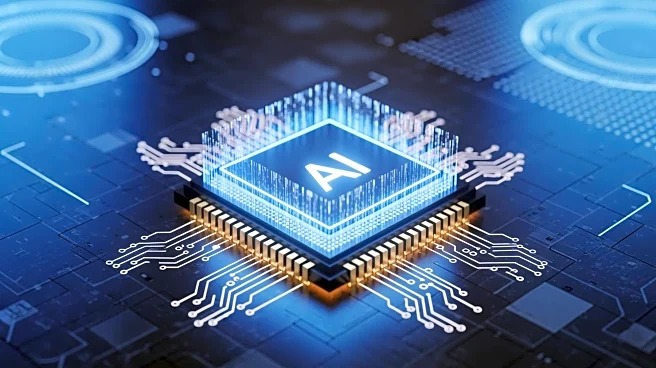What's Happening?
Tesla CEO Elon Musk announced plans to potentially build a large-scale chip fabrication facility to produce artificial intelligence chips, which are crucial for Tesla's autonomous driving systems. During
Tesla's annual meeting, Musk suggested the possibility of collaborating with Intel, although no formal agreement has been reached. This development comes as Tesla designs its fifth-generation AI chip, aiming to enhance its autonomous capabilities. Musk also mentioned partnerships with Taiwan's TSMC and South Korea's Samsung for chip production. The proposed facility, referred to as a 'terafab,' would significantly increase Tesla's chip production capacity, addressing the anticipated demand for AI chips. Musk emphasized the need for a facility capable of producing at least 100,000 wafer starts per month, highlighting the importance of power efficiency and cost-effectiveness in chip design.
Why It's Important?
The potential establishment of a Tesla chip fabrication facility marks a significant step in the company's strategy to become a leader in AI and robotics. By increasing its chip production capacity, Tesla aims to support its autonomous driving technology, which is central to its future growth. Collaborating with Intel could provide Tesla access to advanced manufacturing technologies, potentially boosting Intel's position in the competitive AI chip market. This move could also impact the broader semiconductor industry, as Tesla's entry into chip manufacturing may influence market dynamics and drive innovation. The development underscores the growing importance of AI technology in the automotive sector, with implications for industry standards and consumer expectations.
What's Next?
If Tesla proceeds with the chip fab project, it will likely involve significant investment and collaboration with existing semiconductor manufacturers. The timeline for production suggests initial output in 2026, with full-scale production by 2027. Stakeholders, including Tesla shareholders and industry partners, will closely monitor developments, particularly any formal agreements with Intel. The success of this initiative could accelerate Tesla's autonomous vehicle capabilities, potentially influencing regulatory discussions around self-driving technology. Additionally, the project may prompt other automakers to explore similar ventures, further integrating AI into vehicle design and functionality.
Beyond the Headlines
The proposed chip fab reflects Tesla's broader vision of integrating AI and robotics into its business model, potentially transforming the automotive industry. Ethical considerations around autonomous driving technology, such as safety and data privacy, may gain prominence as Tesla advances its capabilities. The initiative could also impact employment in the semiconductor sector, creating new opportunities for skilled workers. Long-term, Tesla's focus on AI chips may drive technological advancements beyond automotive applications, influencing sectors like healthcare and logistics.










